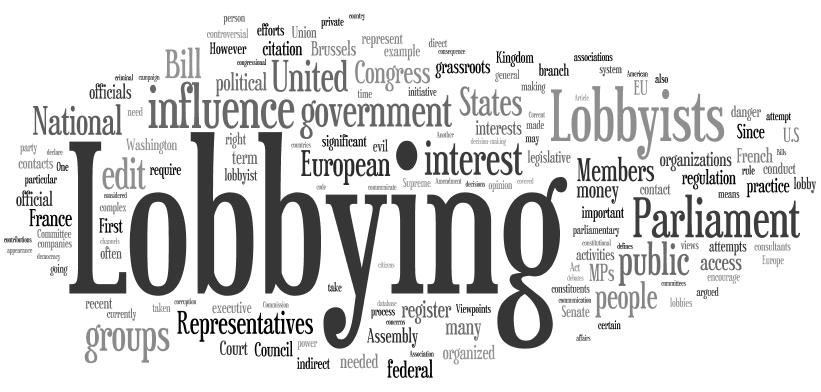Lobbyists play a significant role in political decision-making by advocating for specific interests and influencing policymakers. Their influence can shape legislation, regulatory policies, and public discourse. This article explores how lobbyists impact political decision-making, the mechanisms through which they exert influence, and the implications for democracy and governance.
Understanding Lobbying
1. Definition and Role
Lobbyists:
Lobbyists are individuals or organizations hired to advocate for particular interests or causes to government officials and legislators. They aim to influence policy decisions, legislation, and regulations that affect their clients or causes.
Role in Politics:
Lobbyists provide valuable information and expertise to policymakers, helping them understand complex issues and the potential impacts of proposed legislation. They also mobilize public opinion and support for specific policies.
2. Types of Lobbying
Direct Lobbying:
Direct lobbying involves personal interactions between lobbyists and policymakers. This includes meetings, phone calls, and written communications to persuade officials to support or oppose specific legislation.
Indirect Lobbying:
Indirect lobbying, or grassroots lobbying, focuses on mobilizing public opinion to influence policymakers. This can involve organizing campaigns, petitions, or public demonstrations to garner support for or against a particular issue.
Mechanisms of Influence

1. Access and Relationships
Building Relationships:
Lobbyists often build relationships with policymakers to gain access and influence. These relationships can be crucial in shaping policy discussions and outcomes. Frequent interactions and networking events help lobbyists establish trust and credibility with officials.
Access to Decision-Makers:
Lobbyists with strong connections to key decision-makers may have more influence in shaping policy decisions. Their access allows them to present their case more effectively and respond to policymakers’ concerns and questions.
2. Information and Expertise
Providing Expertise:
Lobbyists often bring specialized knowledge and expertise on complex issues. By providing detailed information and data, they help policymakers make informed decisions. This expertise can be particularly valuable in areas where legislators may lack detailed knowledge.
Drafting Legislation:
Lobbyists may assist in drafting legislation or regulatory proposals. Their involvement in the drafting process ensures that the interests they represent are considered in the final text of the legislation.
3. Campaign Contributions and Political Support
Financial Contributions:
Lobbyists and the organizations they represent often make financial contributions to political campaigns. These contributions can help candidates build their campaigns and gain political support. In return, elected officials may be more receptive to the interests of their contributors.
Political Support:
Lobbyists may also provide political support in terms of endorsements, organizing events, or mobilizing voter bases. This support can enhance a candidate’s visibility and chances of election, creating a reciprocal relationship.
Implications for Democracy
1. Potential for Undue Influence
Unequal Access:
Lobbying can lead to unequal access to policymakers, where well-funded interests have more influence than less-resourced groups. This disparity can undermine the principle of equal representation and disproportionately favor powerful interests.
Policy Bias:
The influence of lobbyists can result in policies that favor specific interests over the broader public good. When lobbyists exert significant influence, there is a risk that policies may prioritize the interests of a few over the needs of the general population.
2. Transparency and Accountability
Need for Transparency:
Transparency in lobbying activities is crucial for ensuring accountability. Requiring disclosure of lobbying efforts, financial contributions, and interactions with policymakers can help the public understand the influence of lobbyists on decision-making.
Regulatory Measures:
Effective regulation of lobbying practices can mitigate potential negative impacts. Implementing strict rules on lobbying activities, financial disclosures, and conflict of interest can help ensure that lobbying serves the public interest and maintains democratic integrity.
Case Studies of Lobbyist Influence
1. The Pharmaceutical Industry
Overview:
The pharmaceutical industry has significant lobbying power, often influencing drug pricing, healthcare regulations, and patent laws. Lobbyists in this sector work to shape legislation that affects drug approval processes and market access.
Impact:
The influence of pharmaceutical lobbyists has led to policies that may benefit the industry, such as extended patent protections or favorable drug pricing regulations. This influence can impact healthcare affordability and access for consumers.
2. The Tobacco Industry
Overview:
The tobacco industry has historically used lobbying to influence public health policies and regulations. Lobbyists have worked to counteract anti-smoking legislation and advertising restrictions.
Impact:
Tobacco industry lobbying has affected the pace and extent of public health initiatives aimed at reducing smoking rates. This influence has had implications for public health outcomes and regulatory efforts.
Strategies for Reform
1. Enhancing Lobbying Transparency
Disclosure Requirements:
Strengthening disclosure requirements for lobbying activities can improve transparency. Mandating detailed reports on lobbying expenditures, interactions with officials, and campaign contributions can help the public and policymakers understand lobbying influence.
Public Access:
Providing public access to lobbying records and communications can enhance accountability. Transparency in lobbying practices allows citizens to monitor and assess the influence of various interests on political decisions.
2. Regulating Lobbying Practices
Limiting Contributions:
Implementing limits on campaign contributions from lobbyists and their clients can reduce the potential for undue influence. Ensuring that contributions are disclosed and monitored can help mitigate the impact of financial incentives on policy decisions.
Ethics and Compliance:
Enforcing ethical standards and compliance rules for lobbyists can help maintain integrity in the lobbying process. Establishing clear guidelines and penalties for violations can ensure that lobbying activities are conducted fairly and transparently.
Conclusion
Lobbyists play a crucial role in political decision-making, influencing policymakers through access, expertise, and financial support. While their contributions can provide valuable insights and support for informed decision-making, the potential for undue influence and policy bias raises important concerns for democratic governance. Enhancing transparency, regulating lobbying practices, and promoting accountability are essential strategies for ensuring that lobbying serves the public interest and upholds democratic principles.
Meta Description:
Explore the influence of lobbyists on political decision-making, including their methods of influence, implications for democracy, and strategies for reform. Discover how lobbyists shape policy and governance.

